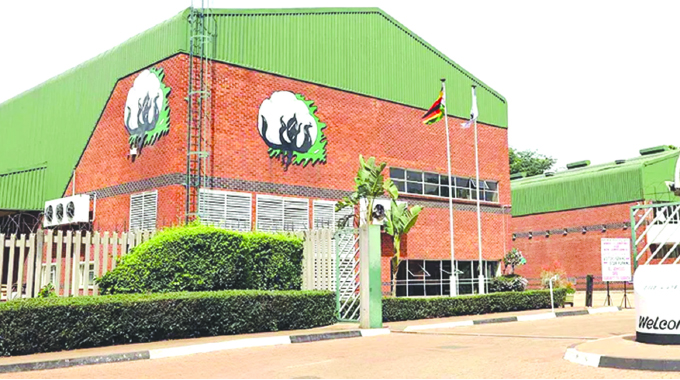Cottco rocked by suspensions of managers, critical staff

Business Reporter
The Cotton Company of Zimbabwe has been rocked by a wave of suspensions of senior managers and critical staff over allegations of inputs abuse, fuel diversion, and pilfering of ginned seed and cotton lint.
An investigation by this publication revealed widespread suspensions of senior managers and key personnel at Cottco, with four business unit managers for Sanyati, Mutare, Muzarabani and Mutoko operations affected.
The Sanyati business unit alone saw a bloodbath, with the business manager, alongside three other senior officials shown the door.
The suspensions extended to lower ranks, with several area managers and accountants frozen out while some have voluntarily resigned, ostensibly, to avoid investigations.
The most recent casualty was the company’s loss control manager Mr Tinomudaishe Hove, who was suspended about two weeks ago for mishandling cases involving alleged inputs abuse.
He also faces charges of undermining the board after allegedly labelling it incompetent. Sources said an additional charge of obstructing the course of justice might be levelled against him after he allegedly took all the files related to the dismissed managers.
The extent of “the housecleaning” suggests a deeply-rooted rot at the heart of the country’s largest cotton company.
Cottco chairman Mr Sifelani Jabangwe confirmed the suspensions, saying investigations have begun.
“This process takes time due to recruitment and clearance procedures for investigators,” Mr Jabangwe told The Herald Finance & Business in an interview yesterday.
“The investigations cover a range of alleged abuses, potentially including theft and we have also involved the police in certain cases. Internal investigations are also ongoing; some have resigned but that will not stop us from holding anyone involved accountable.”
Mr Jabangwe said the company was committed to recovering the Government-supplied inputs and preventing future theft.
He said while the challenges had been identified in Mutoko, Mutare, and Sanyati, the incidents at the affected business units were likely not isolated and investigations would be expanded across operations to restore order and transparency.
Cottco administers the Government’s free inputs programme launched in 2014, which supports nearly 300 000 households across the countryside. The programme, critical for Zimbabwe’s cotton industry, accounts for roughly 85 percent of the national output.
In 2014, Zimbabwe’s cotton industry was on life support. Production had plummeted to 28 000 tonnes, the lowest since a brutal drought that ravaged the nation in 1992. Several cotton contractors fed up with side marketing and farmers abandoning the crop due to meager payouts, had pulled out.
The inputs scheme helped the revival of the cotton industry, despite some occasional dips in drought season with output reaching 144 000 tonnes in 2019/20 season.
A recent audit found missing cotton seeds amounting to 3 000 bags in Kadoma and 4 000 in Sanyati. In Sanyati, 520 bags of fertiliser were also missing along with 1 100 bags in Mutoko.
Mutare reported missing fuel (1 000 litres). Security cameras in Kadoma were conveniently disabled, possibly to facilitate a theft.
“Cottco’s scandals raise serious accountability concerns,” a senior official with the Ministry of Lands, Agriculture, Fisheries, Water and Rural Development, who declined to be named citing protocol issues said.
“Cleaning up the company is crucial to protect taxpayer money.” The Government owns roughly 37 percent shareholding in Cottco. Its interest has since been transferred to Mutapa Investment Fund
The recent audit’s discrepancies have triggered calls for a forensic investigation to further determine the actual extent of the alleged financial mismanagement, sources said.
They further allege that Mr Hove’s “inaction” in addressing the suspected input abuse allowed it to continue, potentially preventing timely intervention.
The revelations support the authorities’ suspicions of input abuse at Cottco, which previously focused on farmers selling or misusing the supplies on non-cotton crops.
Last year, Professor Jiri, Permanent Secretary in the Ministry of Lands, Agriculture, Fisheries, Water and Rural Development, acknowledged the widespread abuse of cotton inputs.
He said transferring distribution responsibility to the Grain Marketing Board aimed to curb the abuse.
The revelations also come amid reports of senior executives jostling for the chief executive’s position since the departure of the former CEO Ms Prisca Mutembwa.
This has seemingly fractured the company’s leadership, with camps forming and fighting for influence.
Cottco terminated the contract of Ms Mutembwa in December 2023, after the expiry of her three months’ probation.
The board decided not to give her a firm contract because she had performed below its expectations. She was appointed in October last year, taking over from Mr Pious Manamike who resigned in December 2022.
“Cottco seems more focused on internal battles than the serious issues plaguing the company,” another source said.
“Communication protocols are disregarded, with some resorting to smear campaigns. Management should be working on survival strategies in light of drought, which will significantly reduce cotton intake.”
Zimbabwe’s cotton industry is suffering its worst season in years due to El Niño drought. El Niño disrupts rainfall patterns, causing dry spells like the one currently devastating Zimbabwe’s cotton crops.
Last year, the country produced 90 000 tonnes of cotton, but this year’s harvest is expected to be much lower due to the lack of rain.
At its peak, Zimbabwe produced 352 000 tonnes during the 2010/11 season.










Comments